Junior Wells
| Junior Wells | |
|---|---|
 Wells performing at the New Orleans Jazz & Heritage Festival, 1996 | |
| Background information | |
| Birth name | Amos Wells Blakemore Jr. |
| Born |
December 9, 1934 West Memphis, Arkansas, U.S. |
| Died |
January 15, 1998 (aged 63) Chicago, Illinois, United States |
| Genres | Chicago blues |
| Occupation(s) | Musician, songwriter |
| Instruments | Vocals, harmonica |
| Years active | 1950s – 1997 |
| Labels | States, Chief, Profile, Delmark, Vanguard, Telarc |
| Associated acts |
The Aces Junior Wells Chicago Blues Band Buddy Guy |
Junior Wells (December 9, 1934 – January 15, 1998), born Amos Wells Blakemore Jr.,[1] was an American Chicago blues vocalist, harmonica player, and recording artist. He is best known for his performances and recordings with Muddy Waters, Earl Hooker, and Buddy Guy. He also performed with Bonnie Raitt, the Rolling Stones, and Van Morrison.[1]
Life and career
Wells may have been born in Memphis, Tennessee,[1] and raised in West Memphis, Arkansas (some sources report that he was born in West Memphis).[2][3] Initially taught by his cousin, Junior Parker, and by Sonny Boy Williamson II, Wells learned to play the harmonica skillfully by the age of seven.
He moved to Chicago in 1948 with his mother, after her divorce, and began sitting in with local musicians at house parties and taverns.[4] Wild and rebellious but needing an outlet for his talents, he began performing with the Aces (guitarist brothers Dave and Louis Myers and drummer Fred Below) and developed a modern amplified harmonica style influenced by Little Walter.[4] In 1952, he made his first recordings, when he replaced Little Walter in Muddy Waters's band and played on one of Muddy's sessions for Chess Records in 1952.[4] His first recordings as a bandleader were made in the following year for States Records.[5] In the late 1950s and early 1960s, he recorded singles for Chief Records and its subsidiary, Profile Records, including "Messin' with the Kid", "Come on in This House", and "It Hurts Me Too", which would remain in his repertoire throughout his career. His 1960 Profile single "Little by Little" (written by Chief owner and producer Mel London) reached number 23 on the Billboard R&B chart, the first of his two singles to enter the chart.[6]
Wells's album Hoodoo Man Blues, released in 1965 by Delmark Records, featured Buddy Guy on guitar.[4][7] The two worked with the Rolling Stones on several occasions in the 1970s.[7] Wells's album South Side Blues Jam was released in 1971 and On Tap in 1975.[7] His 1996 release Come on in This House includes performances by the slide guitarists Alvin Youngblood Hart and Derek Trucks, among others.[7] Wells appeared in the film Blues Brothers 2000.[4]

Wells told the following story, printed on the cover of Hoodoo Man Blues: "I went to this pawnshop downtown and the man had a harmonica prices at $2.00. I got a job on a soda truck... played hookey from school ... worked all week and on Saturday the man gave me a dollar and a half. A dollar and a half! For a whole week of work. I went to the pawnshop and the man said the price was two dollars. I told him I had to have that harp. He walked away from the counter – left the harp there. So I laid my dollar-and-a-half on the counter and picked up the harp. When my trial came up, the judge asked me why I did it. I told him I had to have that harp. The judge asked me to play it and when I did he gave the man the 50 cents and hollered "Case dismissed!" (1948)
Wells began to have severe health problems, including cancer and a heart attack, in 1997.[4] He died in Chicago on January 15, 1998, and was interred in the Oak Woods Cemetery, Chicago.[1][8]
Album discography
† indicates albums with Buddy Guy.
|
|
See also
References
- 1 2 3 4 "The Dead Rock Stars Club 1998–1999". Thedeadrockstarsclub.com. Retrieved January 6, 2015.
- ↑ Eagle, Bob; LeBlanc, Eric S. (2013). Blues - A Regional Experience. Santa Barbara: Praeger Publishers. p. 163. ISBN 978-0313344237.
- ↑ Ratliff, Ben (January 17, 1998). "Junior Wells, Central Player in Chicago Blues is Dead at Age 63". The New York Times. Retrieved October 11, 2010.
- 1 2 3 4 5 6 "Biography by Bill Dahl". Allmusic.com. Retrieved May 21, 2009.
- ↑ "The United and States Labels Part I (1951-1953)". Campber.people.clemson.edu. Retrieved 2016-08-02.
- ↑ Whitburn, Joel (1988). Top R&B Singles 1942–1988. Record Research. p. 438. ISBN 0-89820-068-7.
- 1 2 3 4 Russell, Tony (1997). The Blues: From Robert Johnson]to Robert Cray. Dubai: Carlton Books. pp. 183–184. ISBN 1-85868-255-X.
- ↑ Junior Wells at Find a Grave
External links
- Centerstage Chicago Obituary
- Elvis Pelvis Obituary
- Island Net Obituary at the Wayback Machine (archived August 10, 2003)
- Junior Wells at AllMusic